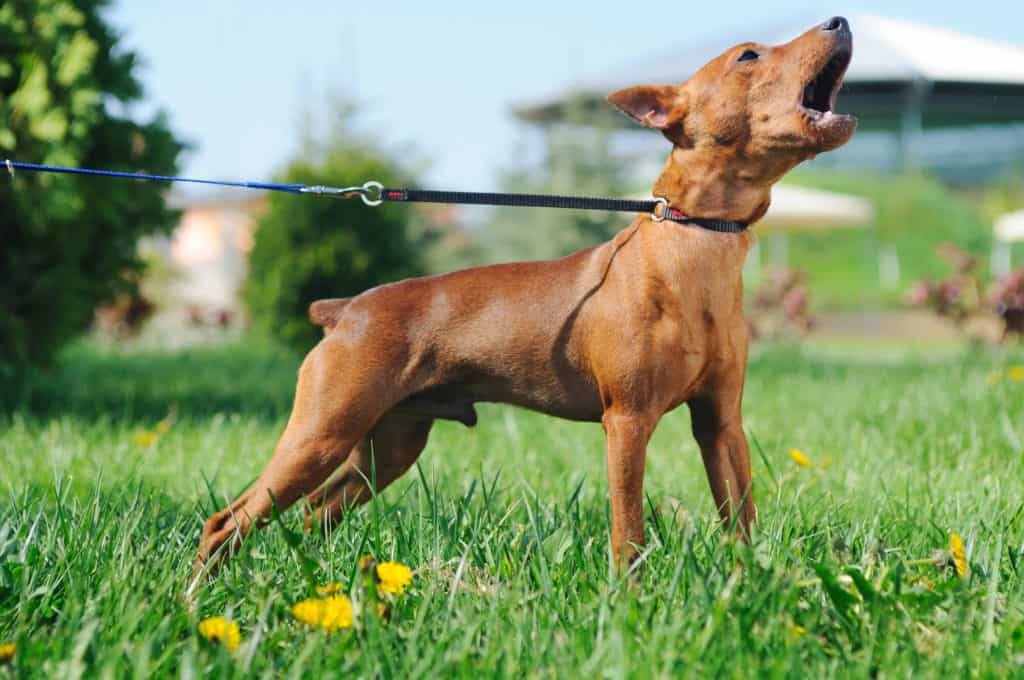Puppies bark for many reasons, but how long can a puppy bark? A puppy can bark for a whole night without stopping. An adult dog, on the other hand, can bark for days without taking a break!
Barking is generally a normal behavior for dogs. It’s their means of communication, and it could sometimes mean excitement, distress, or boredom.
Puppies generally bark for short periods, and they usually do so when they need something, just like babies. Yet, when your puppy refuses to stop barking, you should look for the cause.

What Can Cause Puppies to Bark for a Long Time?
Generally, puppies bark for a variety of reasons. Keep in mind that barking is often a normal behavior in dogs and that there are various reasons for it.
We’re more specifically targeting the reasons that make ‘puppies’ bark for a long time. Here are they:
- Fear
- Boredom
- Attention seeking
- Separation anxiety
Helpful Dog Training Resource:
For help with training your dog, you should take a look at The Online Dog Trainer by Doggy Dan. Doggy Dan is an expert Dog Trainer based in New Zealand. His online resource contains Hundreds of Excellent Dog Training Videos that will take you step-by-step through the process of developing a healthy, happy well-behaved dog.
Fear
A newly adopted puppy may still be scared in his new home. The fear may not show during the daytime because of the present distractions.
At night, however, is when your puppy may bark out of fear. This happens more often in the first few days after adoption.
This barking could be very annoying and even hurt your sleep. You may be tempted to go out and try to calm your puppy down or even yell at him.
We recommend against both of those actions. If your puppy picks the pattern that you come around when he barks, you’ll be essentially encouraging him to bark as if to summon you.
Instead, leave your puppy alone at night (while making sure that he’s okay and well-fed, of course.) Puppies would soon realize that night barking is useless and that bedtime is bedtime.
Boredom

A bored puppy is a stressed puppy. All of that baby energy needs to come out.
If you don’t spend enough quality time with your puppy, he will use up that energy by barking non-stop.
Unlike the night barking, you shouldn’t ignore boredom barking, especially if you aren’t spending a lot of time with your puppy.
Yet, it would help more if you didn’t interact with your puppy immediately as he barks to avoid feeding that “bark to summon my owner” instinct.
Instead, try to wait until your puppy stops barking and then spend some time with him. Alternatively, you may give him a toy or anything to distract him.
Boredom barking may extend for a while, but it won’t be as annoying as night barking.
Attention Seeking
It’s easy to confuse between attention-seeking barking and boredom barking. They overlap each other most of the time.
A bored puppy may bark to get your attention. You won’t be able to tell if your puppy is barking because of boredom or because he wants you to notice him.
If your puppy doesn’t usually bark to call your attention to something, it might be worth checking out the reason for that barking.
Otherwise, it’s best not to encourage your puppy to bark-summon you.
Separation Anxiety
Separation Anxiety can happen to a dog at any age. It may be even more apparent for a puppy that’s used to seeing you every day.
Your puppy finds so much comfort when he sees you at home. You may not be interacting with him as much, but he still feels safe that you’re there.
When you’re not around for extended periods, your puppy will start building up stress. He’ll start to be easily aggravated, moody, and may bark continuously.
When your puppy starts to show signs of separation anxiety, you should get closer to him even if he barks. This is a situation where getting closer to your puppy would discourage the barks instead of encouraging them.

Can Excessive Barking Hurt My Puppy?
Excessive barking can indeed hurt your puppy’s throat if it persists for a long time.
Barking may sound loud and disturbing to us because we may assume that it’s how the dog shouts. Yet, barking doesn’t place a toll on dogs’ vocal cords like shouting places on ours.
Excessive barking to dogs is like excessive talking to us. A teacher may get some pain in their throat after a long day and, in some cases, develop some inflammation.
Similarly, a dog that barks for a long time will induce a lot of pressure on his vocal cords and may inflame them. A puppy whose vocal cords aren’t as developed may hurt itself from excessive barking faster than an adult dog.
Helpful Dog Health Resource:
Note: Our Health is #1 Priority. It should be no different for your dog. But you need to help him. The Ultimate Guide to Dog Health is the answer. This handy guide will help you recognize the symptoms of the health problems above. Get the knowledge to stay ahead of these terrible issues that can rob your lovely dog from vigor and life. Help your friend make it to 14 yrs+ without pain and suffering.
Can I Train My Puppy to Stop Barking on Command?
You can train your puppy to stop barking when you ask him to. It’s a little tricky and may take some time, but it’s doable.
We’ve mentioned earlier that you shouldn’t encourage your dog to bark more by yielding to his barking requests. That should remain true until you start house training.
After training, your post-training solution to the barking will be one word; quiet.
You achieve that result by rewarding your puppy when he stops barking. Pair that action with the word ‘quiet,’ and your puppy will associate that word with silence.
Step 1: (Say Quiet)
When your dog barks, calmly but firmly say ‘quiet’ while looking at your dog. If he stops barking, immediately reward him with a tasty treat like meat or chicken.
You may also pair that gesture with putting one finger over your lips as you say ‘quiet.’ puppies can quickly pick up your body language, and it will speed up the training process.
Step 2: (Keep Saying Quiet)
Repeatedly use the ‘quiet’ plus ‘a tasty treat’ combination.
With repetition, your dog will know that when you say quiet, then it’s time to stop barking.
Step 3: (Say It but Don’t Yell It)
Do your best not to shout or yell the word quiet. It may occasionally work, but your dog will eventually think that your yelling is an invitation to continue barking. In other words, yelling will make it worse.

Paul has been creating content for the dog niche for many years. The information he shares comes his first hand experience growing up in dog lovers household and then owning multiple dog breeds of his own as an adult. Paul enjoys doing the hard research to collect, analyze and present our dogtemperament.com readers with the best answers to their questions.